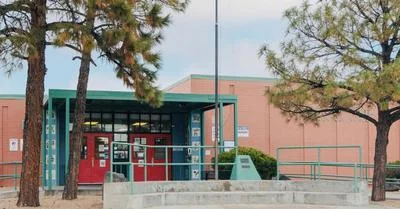University of New Mexico Department of Physics and Astronomy graduate student Josef Sorenson has been selected to receive the U.S. Department of Energy Office of Science Graduate Student Research (SCGSR) award. This recognition will allow him to pursue his Ph.D. next year at Lawrence Berkeley National Laboratory (LBNL) with his proposal, “Co-design of sensors and electronics for 4D trackers.” The project involves experiments with readout electronics on sensors for the ATLAS experiment, which measures high-energy proton collisions.
Sorenson began researching with the ATLAS group at UNM in Fall 2021. The ATLAS experiment aims to probe the smallest components of matter by measuring high-energy proton collisions. At UNM, Sorenson focuses on silicon sensors used to measure collision products, while at LBNL he will work on the readout electronics for these sensors. Both components need to maintain excellent timing resolution despite exposure to high levels of radiation. Sorenson's study seeks to determine the radiation tolerance levels of the readout electronics.
Utilizing ATLAS data, Sorenson searches for physics processes beyond the Standard Model and develops new detectors for particle tracking. Analyzing recorded particle collision events from the Large Hadron Collider (LHC) requires complex data-acquisition and computing systems.
ATLAS is one of two general-purpose detectors in the LHC, weighing 7,000 tons and recognized as the largest volume particle detector ever constructed. The European Council for Nuclear Research houses ATLAS in an underground cavern near Meyrin, Switzerland. Over 5,500 scientists from 245 institutes across 42 countries collaborate on this experiment.
Last year, Sorenson also received the U.S. Department of Energy and Istituto Nazionale de Fisica Nucleare (DOE-INFN) Summer Students Exchange Scholarship. He traveled to Genoa, Italy, last fall to work with INFN's LHC and ATLAS group where he participated in assembling and testing 3D modules, developing a system test for module electrical qualification on a support structure, and optimizing its mechanical and thermal qualifications.
The SCGSR program acknowledges outstanding academic achievements such as Sorenson’s research proposal which highlights his potential contributions to DOE’s mission. It provides supplemental awards enabling U.S. graduate students to conduct part of their thesis research at DOE laboratories or facilities that address scientific challenges central to DOE’s mission.
The research opportunity is designed to advance graduate students' doctoral theses while offering access to expertise and resources available at DOE laboratories/facilities. The award includes a monthly stipend up to $3,000 for living expenses plus an additional $2,000 for travel.
For more information about SCGSR, visit the DOE’s Office of Science Graduate Student Research Program website.
___









